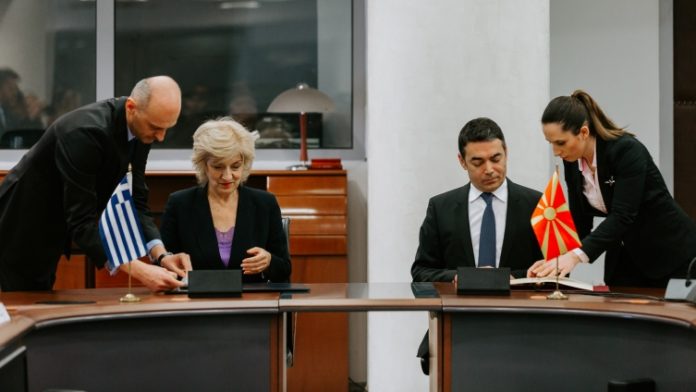Is the Government completely giving up on the Macedonian minorities? Although the claims of the leaders of the ruling majority were that minorities remain protected, according to the statement of Greek Foreign Minister Athanasia Anagnostopoulou, Macedonian Foreign Minister Nikola Dimitrov protects minorities by saying that the Macedonian minority in Greece does not speak Macedonian, Alfa reported.
In a statement to a Greek state news agency following her visit to Macedonia at the Markova Noga border crossing, above all other statements, she stressed Dimitrov’s statement in which he allegedly clarified that according to Article 7 and the spirit of the Prespa Agreement, the Macedonian language spoken by the citizens of Macedonia and its dialects have nothing to do with the idioms spoken by the Greek Macedonians.
We welcome Dimitrov’s statement because it puts an end to any fear of non-existent problems that would arise from the language that we have recognized decades ago, said the Greek minister.
Vladimir Milcin reacted sharply to Dimitrov’s statement. On Facebook, he commented that the language is Macedonian and no one has the right to call it North Macedonian or to limit it within the borders of the Republic of North Macedonia.
The language we are speaking today was once called “our language” in an attempt to save their head. The language we understand each other with parts of the population in the neighboring countries and even countries across the ocean is called Macedonian and no one has the right to call it North Macedonian or to limit it within the borders of the Republic of North Macedonia, Milcin wrote on Facebook.
Just a few days ago in an interview with TV SKAI, Dimitrov said that the Macedonian minority is a Greek issue and that the Prespa Agreement is obliged not to interfere with Athen’s internal affairs.
With the signing in Nivitsi, Prime Minister Zaev and Minister Dimitrov agreed that the Macedonian pupils instead of Solun should study of Thessaloniki, if so far it was Kukuš, they will now read about Kilkis. Practically, Macedonia will have to use the same terms, ie toponyms as Greece, and for the Serbs and Bulgarians Solun will remain Solun, but for the Macedonians, ie the citizens of North Macedonia, it will be Thessaloniki.





Comments are closed for this post.